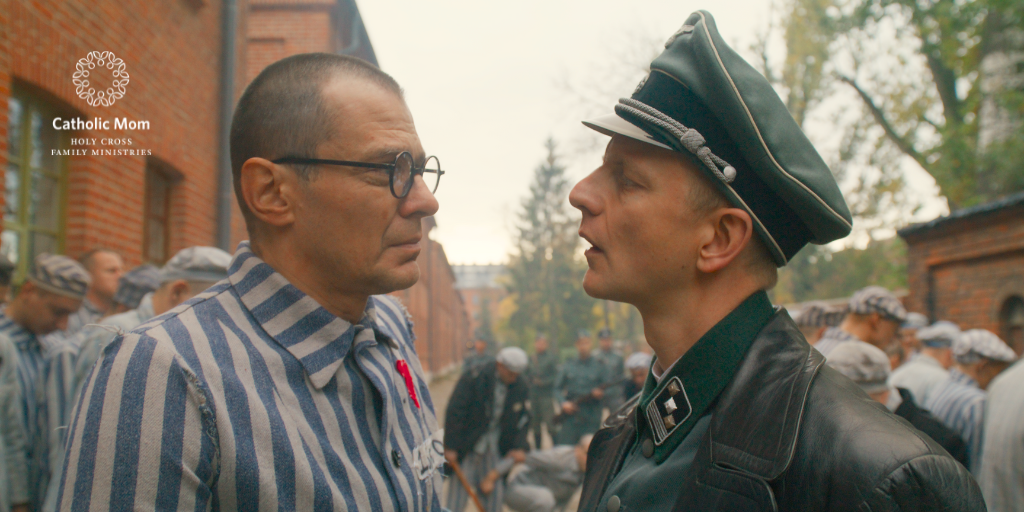
Elizabeth Tomlin reviews a film sure to leave a lasting imprint on the hearts of audiences as it amplifies the life and love of Saint Maximilian Kolbe.
Triumph of the Heart, a new feature-length drama, written and directed by Anthony D’Ambrosio, and produced by Cecilia Stevenson, recounts through exquisite cinematography, screenplay, and acting, how the love of God which surpasses all understanding was brought to a starvation bunker in Auschwitz through Saint Maximillian Kolbe. As a project of Sherwood Fellows, Triumph of the Heart is simultaneously emotionally gutting and uplifting, and cinematically brutal and beautiful.
Triumph of the Heart has already made a significant impact in the Catholic film community. The film is the most successful Catholic Film Kickstarter of all time, raising $160,000 in Kickstarter funds alone. In its beauty and message Triumph of the Heart will certainly leave a lasting imprint on the hearts of audiences and amplify the life and love of Saint Maximilian Kolbe.
The Saint's Story
As background, a Polish priest and Conventual Franciscan, Kolbe served for many years as a missionary. With great devotion to the Blessed Mother, his community published Knight of the Immaculata, a magazine dedicated to spreading devotion to the Blessed Virgin Mary. By the time the Nazis invaded Poland in 1938, the publication had grown to a staggering one million copies per month and garnered the attention of the Nazi aggressors. Shortly after the Nazi occupation, Kolbe was interned in Auschwitz concentration camp.
A Film That Begins at the End
D’Ambrosio’s film begins in Auschwitz at the pivotal moment when Kolbe famously embodied Jesus words from John 15:13, “No one has greater love than this, to lay down one’s life for one’s friend.” In this case, the friend was a fellow prisoner — a husband and father — selected along with nine other prisoners to be starved to death as retribution for another prisoner’s escape. When this prisoner was condemned to die, Kolbe stepped forward, identified himself as a Catholic priest, and asked to take the man’s place.
Descending into the starvation bunker the prisoners entered a pit of hell. Yet D’Ambrosio’s film emphasizes the many ways that Kolbe brought light into darkness, hope to despair, unity into division, and Christ’s love to a place intended to snuff out anything but nihilism and evil.
Triumph of the Heart offers a potent antidote to an historic film with similar title. The 1935 Nazi film, Triumph of the Will, was masterful propaganda filmed against the backdrop of the polished granite dais and imposing concrete columns of the Nuremburg rallies, and it seduced Germans into embracing maniacal hatred aimed especially at Jews and also to anyone who professed, as Kolbe did, the triumph of love, and more specifically, the triumph of the One who is Love. In a few instances in Triumph of the Heart, D’Ambrosio depicts a Nazi officer listening to the soundtrack of Triumph of Will on a record player as if he is cajoling or willing himself to continue the torture and terror he is imposing upon the prisoners.
Contrasting the will, Triumph of the Heart offers the antidote of love. In a rare look at the spiritual battle waged inside the starvation bunker, audiences will see that as the days pass, the men first gather their bodies together physically to stay warm. Eventually, Kolbe unites the group spiritually — young and old, educated and illiterate, Catholic, Jewish and non-believing — by appealing to love in their shared humanity and dignity as sons of Poland.
Hope in the Resurrection
Drawing the men into the love of Christ, in one particularly symbolic point in the film, as ash from the crematorium blows through the air, Kolbe bends down the bunker’s earthen floor, gathers dirt in his palm, spits into it to make a paste, and marks his fellow Christian prisoners with the sign of the cross (shaking hands in solidarity with his Jewish brethren who share in the belief that the Lord our God is one.) This scene reminds audiences that, yes, the prisoners’ fate is to die; they are dust and to dust they will certainly return. However, as God created humanity from the earth (see Gen 2:7), and Jesus healed the blind man by anointing his eyes with saliva-moistened earth (see Jn 9:6), these Polish men as earthen vessels, have hope in the Resurrection which cannot be extinguished.

In the 80 years since the Nuremburg rallies, much of the granite dais has been destroyed and concrete has crumbled. The evil that those constructs represented held no enduring power. In contrast, as Kolbe taught, “Only love creates.” Today, Kolbe’s legacy of an imitation of Christ’s love for humanity is amplified magnificently by D’Ambrosio, Stevenson, and the actors and crew of Triumph of the Heart, highlighting that love alone is generative and enduring.

Triumph of the Heart can be screened in theaters beginning September 12. To promote the sharing of this film, those interested can even buy out a theater from September 22-24. For more information on the film and showings, visit TriumphOfTheHeart.com.
Share your thoughts with the Catholic Mom community! You'll find the comment box below the author's bio and list of recommended articles.
Copyright 2025 Elizabeth Tomlin
Images: courtesy of TriumphOfTheHeart.com, all rights reserved, used with permission
About the Author

Elizabeth Tomlin
Elizabeth is the author of Joyful Momentum: Building and Sustaining Vibrant Women’s Groups (Ave Maria Press), General Counsel for the Archdiocese for the Military Services, USA, and director of stewardship for the Military Council of Catholic Women, where she previously served as the president and as director of faith formation. Elizabeth is a catechist and speaker, and blogs at JoyfulMomentum.org.


.png?width=1806&height=731&name=CatholicMom_hcfm_logo1_pos_871c_2728c%20(002).png)
Comments